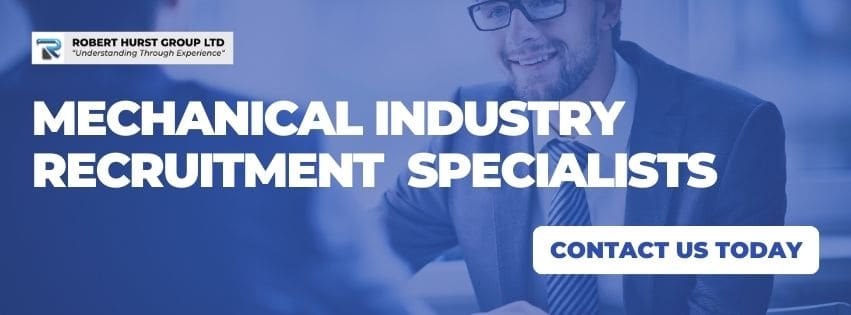In today’s competitive UK construction and mechanical industries, sourcing skilled workers has become a top concern for project managers, site supervisors, and business owners. Labour shortages, regulatory demands, and rising expectations around skills and compliance have turned recruitment into one of the most critical functions within M&E firms.
At Robert Hurst Group Ltd., we understand these pressures. As a specialist recruitment agency focused on the mechanical, electrical, and construction sectors, we’ve helped countless UK companies navigate talent shortages and build reliable, flexible workforces. That’s why we’re sharing these Mechanical Industry Recruitment Tips—not the generic advice you’ll find online, but tried-and-tested insider strategies used by industry experts.
In this guide, you’ll discover lesser-known techniques for delivering results, reducing hiring risk, and giving yourself a strategic edge in the talent race.

Why Mechanical Industry Recruitment Is More Competitive Than Ever
The UK mechanical sector is experiencing historic levels of demand. According to the Construction Skills Network (CSN) forecast, the industry needs over 220,000 additional skilled workers by 2027 to keep up with new infrastructure, public sector retrofits, and private developments. Meanwhile, experienced tradespeople retire, and fewer apprentices enter the pipeline, creating a widening skills gap.
For mechanical firms, this environment means recruitment must be proactive, not reactive. Companies that wait until understaffed risk project delays, budget overruns, and a damaged reputation. By understanding current market pressures, employers can plan better, budget more effectively, and prioritise recruitment as an ongoing strategic function—not just an operational task.
In addition to workforce supply issues, recruitment is affected by site-specific compliance, health and safety obligations, and client-driven quality standards. Today’s employers must balance speed with precision to ensure project success, making recruitment more than just filling vacancies—it means securing dependable, skilled operatives who can hit the ground running.
Tip #1 – Define the Role with Absolute Precision
Create Role-Specific Job Descriptions
Recruitment starts with clarity. A vague or generic job listing is more likely to attract unqualified or mismatched candidates, wasting time and increasing the risk of making a poor hire. Precision matters, especially in the mechanical industry, where roles require specific experience, tools, and certifications.
Tailor your job descriptions to match the demands of the role:
- Clearly state if the role is commercial, domestic, or industrial
- Include required certifications (e.g., CSCS, F-Gas, NVQ levels)
- Mention tools or systems candidates must be experienced with
- Define location, shift patterns, contract duration, and site access requirements
This level of detail not only improves the quality of applicants but also sets expectations upfront, reducing dropout rates and improving site readiness from day one. At RHG, we work closely with clients to fine-tune job briefs, ensuring you attract the right people, not just more people.
Many UK firms overlook the importance of soft skills and site dynamics when defining roles. Including details about team structures, supervision expectations, or lone working scenarios helps ensure the right behavioural and communication fit, reducing friction on site and improving overall productivity.

Tip #2 – Source from Specialist Talent Pools, Not Generic Job Boards
Partner with Industry-Focused Recruitment Agencies
Generic job boards may reach thousands of candidates, but most won’t have the technical qualifications, site experience, or availability required for mechanical roles. For example, an HVAC installer in South Yorkshire won’t apply for a role in Kent unless it’s a long-term project with accommodation—a nuance generalist platforms can’t filter for.
At Robert Hurst Group, our database includes thousands of pre-vetted mechanical professionals—from pipefitters and gas engineers to refrigeration technicians and HVAC maintenance crews—ready to be deployed on short notice.
Our consultants understand the skills landscape across different UK regions and sectors. Whether you need a temporary crew for a factory shutdown or permanent engineers for a facilities contract, we know where to find the talent and how to engage it quickly.
Additionally, niche recruitment agencies bring insight that goes beyond sourcing. We can advise on emerging trends, salary benchmarks, and regional availability—helping you tailor your offer to current market conditions and remain competitive in tight labour markets.
Tip #3 – Speed Is a Strategic Advantage
Streamline Your Hiring Process Without Sacrificing Quality
In today’s market, top candidates often receive multiple job offers within days of becoming available if your hiring process takes too long—whether due to internal bottlenecks, unclear decision-making, or delayed interviews—you risk missing out on the best talent.
To improve speed without compromising quality:
- Use a trusted recruiter who supplies pre-qualified candidates
- Cut unnecessary interview stages and decision layers
- Schedule interviews and compliance checks within 48 hours of application
At RHG, we maintain shortlists of skilled, compliant operatives available for immediate deployment—many of whom have worked with us before. This lets you quickly secure proven talent, reducing downtime and maintaining momentum on-site.
Faster hiring not only secures better talent but also reduces overhead costs. Every unfilled role represents a loss—installation, inspections, or maintenance delays add up over time. A streamlined recruitment process can be the difference between finishing on time or falling behind schedule.

Tip #4 – Prioritise Certifications and On-Site Experience
Go Beyond the CV: What Matters in Mechanical Roles
In mechanical trades, certifications and safety compliance are non-negotiable. A candidate might look impressive on paper, but without valid, up-to-date qualifications and relevant on-site experience, they could pose a risk to your project.
Always verify that candidates hold the following:
- CSCS cards are appropriate for their role (Skilled Worker, Supervisor, etc.).
- NVQ Level 2 or 3, where applicable
- Additional credentials such as F-Gas, IPAF, PASMA, JIB, or Gas Safe registration
- Full PPE and an understanding of site safety protocols
Robert Hurst Group conducts complete compliance checks before introducing candidates, including right-to-work validation and reference verification.
Many mechanical employers are now prioritising operatives who have worked in high-pressure or regulated environments—such as healthcare, education, or industrial plants—where communication and quality control are key. These candidates integrate faster and require less on-site supervision, increasing safety and efficiency.
Tip #5 – Build a Flexible Workforce Strategy
Combine Permanent and Temporary Hires to Meet Fluctuating Demand
The mechanical industry is project-based, with activity levels rising and falling based on contract wins, supply chains, and seasonal peaks. Relying solely on a permanent workforce often leads to overstaffing during quiet periods and understaffing during peak demand.
A mixed workforce strategy offers far more flexibility:
- Use temporary staff for short-term or urgent tasks
- Consider temp-to-perm models to evaluate fit before making a commitment
- Keep a core team of permanent employees for consistency and leadership
RHG helps mechanical employers strike the right balance by creating adaptable staffing plans based on upcoming project pipelines and tender outcomes.
This flexibility is beneficial for businesses working on framework contracts or multi-site projects. Scaling up or down quickly reduces costs, avoids penalties, and maintains client satisfaction. A workforce strategy aligned with delivery milestones is essential for long-term mechanical construction success.

Tip #6 – Offer Competitive Pay and Perks—But Also Purpose
Attract Candidates Who Care About Career Growth
Today’s skilled workers care more about their day rate than their day rate. While competitive wages are crucial, many candidates want stability, respect, progression, and safe working environments.
To attract and retain top mechanical talent:
- Benchmark pay against current regional rates
- Promote training opportunities, site safety culture, and upskilling pathways
- Build a reputation as an employer who values people and supports their career
At RHG, we help employers communicate these benefits clearly in job adverts and during onboarding, helping you attract candidates aligned with your values and more likely to stay long term.
There is also growing interest among skilled workers in environmental and social governance (ESG). Companies that demonstrate their commitment to sustainability, diversity, or local community involvement often see a stronger pipeline of applicants, especially among younger tradespeople.
Tip #7 – Invest in Long-Term Recruitment Partnerships
Why a Specialist Recruiter Like Robert Hurst Group Makes a Difference
A one-off hire might solve a short-term gap—but a recruitment partnership aligned with your business goals can transform your workforce strategy.
At Robert Hurst Group, we provide:
- Dedicated consultants with sector-specific knowledge
- Access to vetted talent available on demand
- Support with forecasting, compliance, and workforce planning
We’ve helped national contractors fill mission-critical mechanical roles in under 48 hours and supported SMEs in building full-site teams for long-term developments. Our long-standing relationships with clients mean we fill roles and drive business outcomes.
With ongoing recruitment support, employers gain consistency, lower costs, and higher retention. It also allows you to respond faster to project wins or unexpected demands without compromising quality. RHG becomes a valid extension of your team—understanding your standards, timelines, and long-term vision.
Conclusion: Turn Recruitment Challenges Into Competitive Strengths
The mechanical industry is evolving quickly. Projects are more complex, talent is scarcer, and client expectations are higher than ever. However, with the right recruitment approach, these challenges can become opportunities.
By following these Mechanical Industry Recruitment Tips and partnering with a specialist like Robert Hurst Group Ltd., you can access top-tier talent, reduce your time-to-hire, and build a workforce that delivers consistent, reliable results.
We don’t just fill roles—we help you grow. Whether you need one operative for a reactive job or a whole mechanical team for a multi-million-pound contract, we’ve got the insight, reach, and experience to deliver.
Ready to build a better workforce?
Contact Robert Hurst Group Ltd. for a no-obligation consultation today, or explore our mechanical recruitment services to control your staffing strategy confidently.
